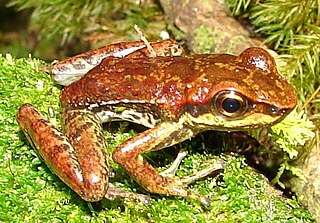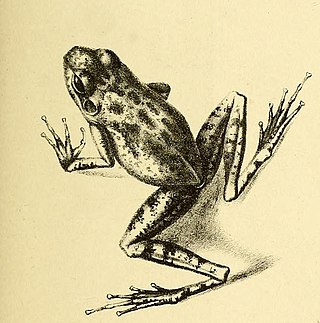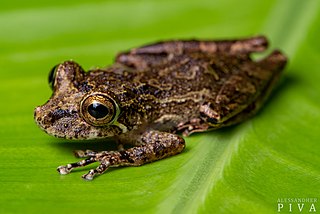Osteocephalus heyeri is a species of frogs in the family Hylidae found in Colombia and possibly Brazil and Peru. Its natural habitat is subtropical or tropical moist lowland forests. It is threatened by habitat loss.
Crossodactylus caramaschii is a species of frog in the family Hylodidae. It is endemic to Brazil.in São Paulo, Santa Catarina, and Paraná. Its natural habitats are subtropical or tropical moist lowland forest and rivers. It is threatened by habitat loss.
Hylodes amnicola is a species of frog in the family Hylodidae. It is endemic to Minas Gerais in Brazil. It has been observed 1400 meters above sea level.

Hylodes is a genus of frogs in the family Hylodidae. The genus may be paraphyletic with respect to Megaelosia. The genus Hylodes is endemic to southeastern Brazil. Member species are also known commonly as the tree toads, or more ambiguously, as torrent frogs. They are diurnal and usually inhabit shallow mountain streams.
Hylodes babax or the Caparao Mountains tree toad is a species of frog in the family Hylodidae. It is endemic to Brazil.
Hylodes charadranaetes, or the Rio tree toad, is a species of frog in the family Hylodidae. It is endemic to Brazil. Its natural habitats are subtropical or tropical moist lowland forest, subtropical or tropical moist montane forest, and rivers. It is threatened by habitat loss.
Hylodes glaber or the Itatiaia tree toad is a species of frog in the family Hylodidae. It is endemic to Brazil and has been observed in and near Itatiaia. Its natural habitats are subtropical or tropical moist montane forest, subtropical or tropical high-altitude grassland, and rivers. It is threatened by habitat loss.
Hylodes lateristrigatus is a species of frog in the family Hylodidae. It is endemic to Brazil. Its natural habitats are subtropical or tropical moist lowland forest, subtropical or tropical moist montane forest, and rivers. It is threatened by habitat loss.
Hylodes magalhaesi, or the São Paulo tree toad, is a species of frog in the family Hylodidae. It is endemic to Brazil. Its natural habitats are subtropical or tropical moist montane forest and rivers. It is threatened by habitat loss. They measure between 28 and 32 mm, and live at altitudes of 1400 to 1800 m in the Mantiqueira mountain range.

Hylodes meridionalis, also known as the Rio Grande tree toad, is a species of frog in the family Hylodidae. It is endemic to Brazil, in the states of Rio Grande do Sul and Santa Catarina. Its natural habitats are subtropical or tropical moist lowland forest and rivers. It is threatened by habitat loss stemming from deforestation, pine and banana plantations, and water pollution, as well as infection from the amphibian chytrid fungus, Batrachochytrium dendrobatidis.
Hylodes mertensi or Merten's tree toad is a species of frog in the family Hylodidae. It is endemic to Brazil. Its natural habitats are subtropical or tropical moist lowland forest and rivers. It is threatened by habitat loss.

Hylodes nasus is a species of frog in the family Hylodidae. It is endemic to Brazil. Its natural habitats are subtropical or tropical moist lowland forest and rivers. This frog has been observed 1400 meters above sea level.
Hylodes ornatus or the ornate tree toad is a species of frog in the family Hylodidae. It is endemic to Brazil. Scientists know it from the type locality, Parque Nacional do Itatiaia in the state of Rio de Janeiro. Its natural habitats are subtropical or tropical moist lowland forest, subtropical or tropical moist montane forest, and rivers. It is threatened by habitat loss.
Hylodes otavioi, Otavio's stream frog, or the Otavio tree toad is a species of frog in the family Hylodidae.
Hylodes perplicatus or Humboldt's tree toad is a species of frog in the family Hylodidae. It is endemic to Brazil. Its natural habitats are subtropical or tropical moist lowland forest and rivers. It is threatened by habitat loss.

Hylodes phyllodes, or the Boraceia tree toad, is a species of frog in the family Hylodidae. It is endemic to Brazil. It has been observed in Serro do Mar in the state of São Paulo. Its natural habitats are subtropical or tropical moist lowland forest and rivers. It is threatened by habitat loss.

Hylodes sazimai is a species of frog in the family Hylodidae. It is endemic to Brazil. Its natural habitats are subtropical or tropical moist lowland forest, subtropical or tropical moist montane forest, and rivers. It is threatened by habitat loss.
Hylodes uai is a species of frog in the family Hylodidae. It is endemic to the Espinhaço Mountains in the Minas Gerais state, Brazil, where it is known from the Mangabeiras Park in Belo Horizonte, and another location on the southern end of the Espinhaço Mountains. It is the most-inland species of the genus.

Phantasmarana apuana is a species of frog in the family Hylodidae. It is endemic to Brazil. Its natural habitats are subtropical or tropical moist montane forest and rivers. It is threatened by habitat loss.

Ololygon is a genus of frogs in the family Hylidae. The majority of species in it are endemic to the Atlantic Forest of eastern Brazil, although the range of some species, including Ololygon aromothyella and Ololygon berthae, is known to extend south to northeastern Argentina, southern Paraguay, and Uruguay.








